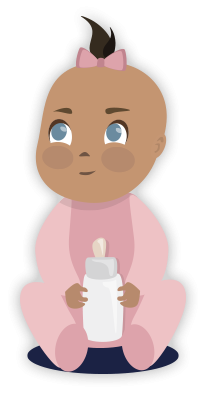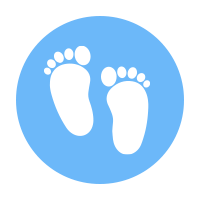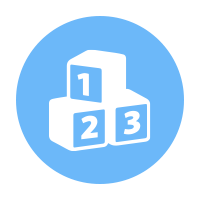6-8 Months:
- Will eat thicker pureed foods at 7 months.
- Will eat grounded or mashable food at 8 months.
- Will move tongue up, down and side to side when chewing food.
- Will hold own bottle during feed.
- A cup can be introduced with adult support - Will take large amounts of liquid in each sip, much liquid will spill out the mouth, may cough or choke in response.
- Will mouth or chew on, spoon, teethers, toys and baby biscuits.
9-12 Months:
- Will take longer sucks when drinking from a cup but may still struggle coordinating breathing and drinking.
- Start to eat finger food by themselves.
- Start to grip a spoon but may not be able to bring it to the mouth and feed themselves.
- Will start to move jaw and tongue a lot more during eating, will also start to move food around the mouth.
- Talk with your baby’s doctor about when to start solid foods and what foods are choking risks. Breast milk or formula is still the most important source of “food” for your baby.
- Learn when your baby is hungry or full. Pointing to foods, opening his mouth to a spoon, or getting excited when seeing food are signs that he is hungry. Others, like pushing food away, closing his mouth, or turning his head away from food tells you that he’s had enough.
- Find out about choking risks and safe foods to feed your baby.
- Let him practice feeding himself with his fingers and using a cup with a small amount of water.
- Sit next to your baby and enjoy mealtime together. Expect spills. Learning is messy and fun!
- Help your baby get used to foods with different tastes and textures. Foods can be smooth, mashed, or finely chopped. Your baby might not like every food on the first try. Give her a chance to try foods again and again.
- At 12 months, give your baby water, breast milk, or plain milk. You don’t need to give your baby juice, but if you do, give 4 ounces or less a day of 100% fruit juice.
- Do not give your baby other sugary beverages, such as fruit drinks, soda, sports drinks, or flavored milks.
- Give your baby pots and pans to play like musical instruments. Encourage your baby to make noise.
- Is there anything your baby does or does not do that concerns you?
- Has your baby lost any skills he/she once had?
- Does your baby have any special healthcare needs or was he/she born prematurely?
If your baby is not meeting one or more milestones, has lost skills he or she once had, or you have other concerns, act early. Talk with your baby’s doctor, share your concerns, and ask about a developmental screening.
If you or the doctor are still concerned:
- Ask for a referral to a specialist who can evaluate your baby more.
- If the evaluation still shows concerns call your state Early Intervention program to find out if your baby can get services to help. Learn more and find the number at Missouri First Steps Program.
What's Next?
Download the Milestone Tracker app today!
Track your child’s milestones from age 2 months to 5 years with the CDC’s easy-to-use illustrated checklists; get tips from the CDC for encouraging your child’s development; and find out what to do if you are ever concerned about how your child is developing. Photos and videos in this app illustrate each milestone and make tracking them for your child easy and fun.













